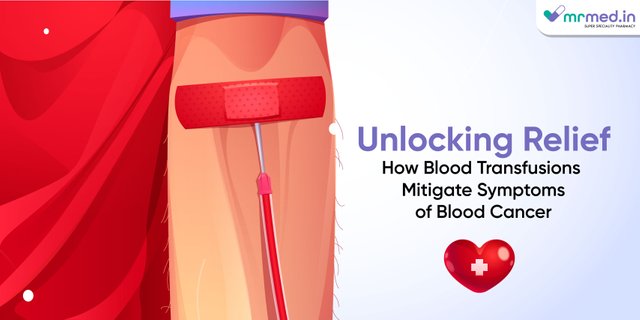Unlocking Relief: How Blood Transfusions Mitigate Symptoms of Blood Cancer

Blood transfusions often play an important role in alleviating the symptoms of blood cancer, but it does not help in treating it. Blood cancer refers to a cancer that affects the blood cells in the individual; the three main types of blood cancer are leukemia, lymphoma, and myeloma. It can help replace red blood cells, platelets, and other blood components using the cells that healthy volunteers donated. Today, we are going to discuss blood transfusion in mitigating blood cancer symptoms.
Symptoms of blood cancer
Some of the common symptoms of blood cancer are given below:
1)Sudden weight loss: Individuals may experience a sudden weight loss.
2)Bruising or bleeding: The patient may experience unusual bruising or bleeding.
3)Lumps: Individuals may have lumps or swelling in their body.
4)Shortness of breath: Patients may experience difficulty in breathing.
5)Night sweats: Individuals may have an unexplained sweat, especially during the night.
Infections that are persistent, recurrent, or severe: Individuals may have a persistent or severe infection that doesn't heal.
Fever: Individuals may have a rise in temperature.
Rash or itchy skin: Individuals may have an unexplained rash or itchiness in the skin.
Pain: Individuals may experience pain in their bones, joints, or abdomen (stomach area)
Tiredness (fatigue): Patients may experience tiredness, which does not improve even after taking enough rest.
Type of blood transfusion and its role in blood cancer
Blood consists of different components: liquid plasma, red blood cells, white blood cells, and platelets. It is less common to transfuse whole blood compared to one of its components. Some of the types of blood transfusion are given below:
Red Blood Cell Transfusion:
Red blood cells are produced from the bone marrow, which helps carry oxygen to all parts of the body through the hemoglobin. Red blood cell transfusion can occur in someone with a low red blood cell count. It is usually given to patients with symptoms of dizziness, fatigue, or shortness of breath.
Platelet Transfusion:
A low platelet count is also known as thrombocytopenia. It might be caused by blood cancer treatment, which can lower the platelet level in patients. In some cases, platelet transfusion can be given to patients who have an increased risk of bleeding during the surgery.
Granulocyte Transfusion:
It is a rare transfusion that can be done in people with a very low white blood cell count, leukopenia, or neutropenia. Your doctor can also prescribe a WBC growth factor that helps stimulate the body to produce the WBC.
Plasma transfusion:
It is a liquid part of the blood which helps to transport nutrients, hormones, and proteins to the other parts of the body. A plasma transfusion can be preferred for people with a bleeding disorder, which may worsen during the cancer treatment. It can also be given after the surgery to prevent excessive blood loss.
Autologous blood donation
In some cases, an individual can serve as their own blood donor. It is also referred to as
autologous blood donation or autotransfusion. Patients can transfer their own blood before undergoing surgery if they need a blood transfusion during or after the surgery.
Side effects of blood transfusion
Fever, chills, headache, or nausea: Individuals may experience a fever, chillness, headache, or nausea due to the immune response after the blood transfusion.
Allergic reaction: Patients may experience allergic reactions like hives or itching after the blood transfusion. In certain cases, it can cause a life-threatening allergic reaction in individuals.
Hemolytic reaction: It is a very rare reaction in which the donor blood doesn't match with the recipient blood, which can lead to the breakdown of red blood cells by the antibodies (recipient)
Transfusion-related acute lung injury (TRALI): Individuals may have lung damage and fluid accumulation in the lungs after the transfusion.
Circulatory overload: Patients may have an excessive blood volume, which can cause breathing difficulty and heart failure.
Iron overload: Individuals may have excessive iron overload in the blood, which can damage the heart, liver, and other organs.
Infectious disease: In rare cases, individuals may have an infection in the blood due to the poor screening of the donor blood.
Blood transfusion is an effective method to mitigate blood cancer symptoms and the effects of cancer medicine effects in blood cancer patients. Proper screening procedures like hematology studies and tailored treatment plans can help to reduce the blood transfusion side effects. Blood cancer awareness helps educate blood cancer patients on getting a proper diagnosis and treatment plans. You should engage with your doctor to get the best blood transfusion based on your health condition.